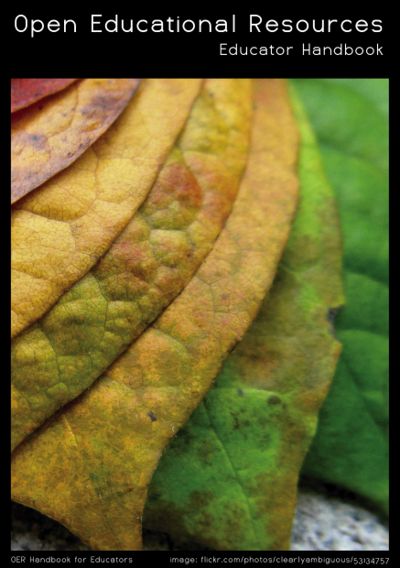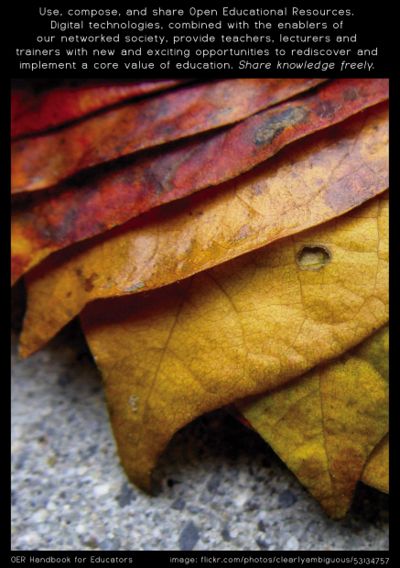OER Handbook for Educators 1.0
| OER Handbook for educators | |
|---|---|
| Contents | | Introduction | Find | Compose | Adapt | Use | Share | License | Conclusion | Appendices |
In this handbook
Welcome to the world of Open Educational Resources (OER). This handbook is designed to help educators find, use, develop and share OER to enhance their effectiveness online and in the classroom.
Although no prior knowledge of OER[1] is required, some experience using a computer and browsing the Internet will be helpful. For example, it is preferable that you have experience using a word processor (e.g. Open Office[2] or Microsoft Word) and basic media production software, such as an image editor (e.g. Gimp[3], Inkscape[4] or Photoshop).
The handbook works best when there is some sort of OER you would like to create or make available to others, but it is also useful for the curious reader.
There are several ways to use this handbook, including:
- Cover-to-cover, which is intended for newcomers who want to gain an understanding of OER and engage in the whole development cycle (find, compose, adapt, use, share, ...) in a real world setting;
- Individual sections, as a quick reference for educators engaged in OER development looking for pointers at any stage in the OER development cycle.
You are not expected to be an instructional designer or media production expert to use this book. If you encounter a term with which you are unfamiliar, check the glossary at the end of the handbook for a definition.
What this handbook does not cover
OER is a broad topic and it would be difficult, if not impossible, to cover it comprehensively. This handbook does not include tutorials on the software used, though the URLs of some tutorials have been provided. It also does not prescribe a particular teaching method when using OER.
If you are educational technology staff at an institution, the institution handbook may be more appropriate for you. There will also be a handbook available for policy-makers such as superintendents and higher education staff. See the Introduction to Other Handbooks in Conclusion for more information.
Notes
- ↑ http://en.wikipedia.org/wiki/Open_educational_resources
- ↑ http://www.openoffice.org/
- ↑ http://www.gimp.org/
- ↑ http://www.inkscape.org
Introduction
- Introduction
- Defining OER
- Why OER?
- The Copyright Paradox
- Considerations
- Models and Approaches
- OER Life Cycle
Find OER
- Find
- Find Your Own Resources
- Search Engines
- General Repositories
- Specific repositories
- Open Textbooks
- Individual project sites
- File formats
- Accessibility
- Perspectives
Compose OER
- Compose
- Quality
- Audio
- Images
- Learning Support Systems
- Office
- Web Authoring
- Video
- Mobile Access
- Perspectives
Adapt OER
Use OER
- Use
- Integrating OER in Teaching and Learning
- Using Mobile Versions
- Evaluation
- Accessibility
- Perspectives
- Share
- Self- or Third-Party Publishing?
- Self-Publishing
- Third-Party Publishing
- Linking Between Versions
- Publishing Students Work
- Accessibility
- Perspectives
Licensing
- License
- Copyright Clearance
- License Compatibility
- Creative Commons
- Adding a Creative Commons License
- GFDL
- Which License Should I Choose?
- Perspectives
Conclusion
- Conclusion
- The Future of OER
- Encouragement
- Introduction to Other Handbooks
- Additional Reading
- OER Forums
- Glossary
Appendices
Other Formats
The OER Handbook can be printed from Lulu in Black and White or color. The PDFs are also available, free of charge, at Lulu. Custom PDFs can be generated using WikiEducator's Collections feature.
Credits
- Authors - User:Sgurell
- Graphics - Sunshine Connelly
- Editor - David Wiley
- Project manager - Seth Gurell

